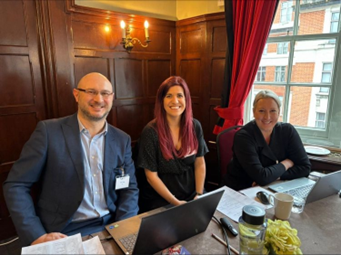Creating a Legacy for Trades – Supporting the Workforce of the Future
In the first in this series of three articles, we explore the importance of apprenticeships and how the sector can work together to create a lasting legacy.

Part 1 – Working together
As a result of our ongoing collaboration with colleagues at the Direct Works, the NHMF has been considering how we can work together to bring a new dimension to the challenges of recruiting apprentices, improvers or mature new entrants to sector.
One initiative we are exploring as a group, is how to harness the skills and abilities of those who have been on the tools for many years and are in, let’s say the ‘twilight years’ of their career. Specifically, we will be exploring how this untapped expertise could be redirected to provide the support and transfer of knowledge as part of a legacy into the sector.
The current position is that multi-skilling is now more mainstream than it has been in the last 20 years, based on a core trade – be it carpentry, bricklaying, roofing, plumbing, electrical etc., additional skills are now being recognised and supported by the CSCS scheme.
However, most new entrants are seeking job placements as well as the practical and theoretical college courses. In some cases, construction placements are being sought for a three-year period, but many sites have a life cycle less than that, leading to some students being left in limbo as sites are handed over.
The benefits that the Repairs, Maintenance and Improvements (RMI) sector has to offer relate to an ongoing supply of activity that is both open ended, varied and supports all the principles encountered within general building applications. Added to that, the skills base is drawn from a wide cross section of the industry as a whole, and perhaps provides the widest skills bank in the UK, albeit an ageing one.
There is a golden opportunity to provide a legacy programme that will encourage the transfer of knowledge and skills to those entering the RMI marketplace. Having been on the tools for many years, the impact on the body is significant. Hands, arms, shoulders, knees and backs start to deteriorate to an extent where prolonged activity is painful and debilitating. But the mind is still very active and has a substantial repository of theoretical and practical knowledge gained over very many years.
Let’s imagine that aged 60, a skilled operative is given an opportunity to become a mentor to one or more new entrants for the equivalent of one day per week, which may be split over four days, allowing for any college work to be accommodated. Each year thereafter, the reduction on the tools is offset by the mentoring support to an extent that a year before retirement at the age of 65, the mentor is working full-time, supporting the workforce of the future.
This principle can assist all parties - from the employer in the long-term investment of their workforce and a profile raising USP, to the legacy provider in the knowledge that their skills and abilities are valued in being responsible for passing on the life and working skills to the next generation. Finally, the new entrant benefits from a clear commitment for the duration of their training. In fact, it could be argued that their ongoing training can be further developed into additional specialist skills - site management, supervisory activities and so on.
By working together to create a pathway that provides support and encouragement - both practically and emotionally, the sector can provide tangible opportunities to create a legacy for an industry struggling to meet demand. I firmly believe that by demonstrating loyalty to those who have given their best for many years and would like to continue to play an active role, the sector has a real opportunity to ensure the next generation is well-equipped to tackle the challenges ahead.
_________________________________________________________________________
Next in the series: Why are apprenticeships so important?
Former apprentice turned employer, Ettan Bazil, Director at Trade Innovations Ltd. & Elite Heating and Plumbing shares his own experiences of the apprentice life cycle and why this is key to maintaining a skilled workforce.
__________________________________________________________________________

About the Author
Jon Cross | NHMF Treasurer & Managing Director, Essenjay Associates
In his 3rd career, Jon has over 20 years’ experience at senior levels within property services. Responsible for asset management and RMI functions with RSL’s from 6,000 to 35,000 units. Key achievements include creating CITB Multi Skills qualifications, building the first Multi Skills Training Centre in the UK, part of the Government Green Deal development team.
Member of Acquisition & Merger team bringing two significant RSL’s together, creating and embedding a DLO servicing 35,000 units.
Won first SHIFT Gold award for medium sized RSL in UK. Won Inside Housing community award for delivering a House of the Future project with schools and the community.
A fellow of the Institute of Directors and current NHMF Treasurer. He is an independent non-executive director, serves on several local committees and is currently working on several National Environmental projects.


